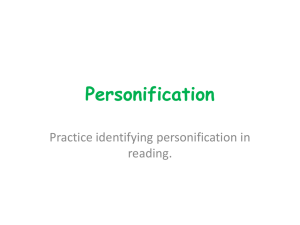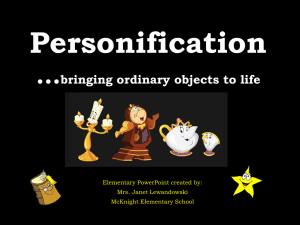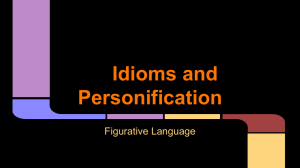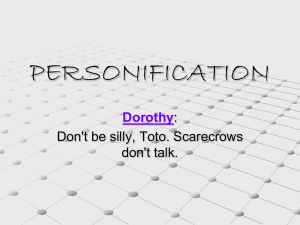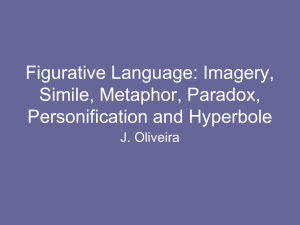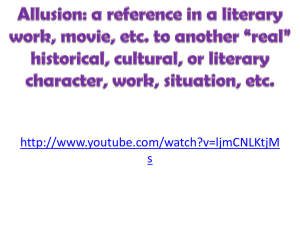Part 2 - hcmscmarshall8english
advertisement
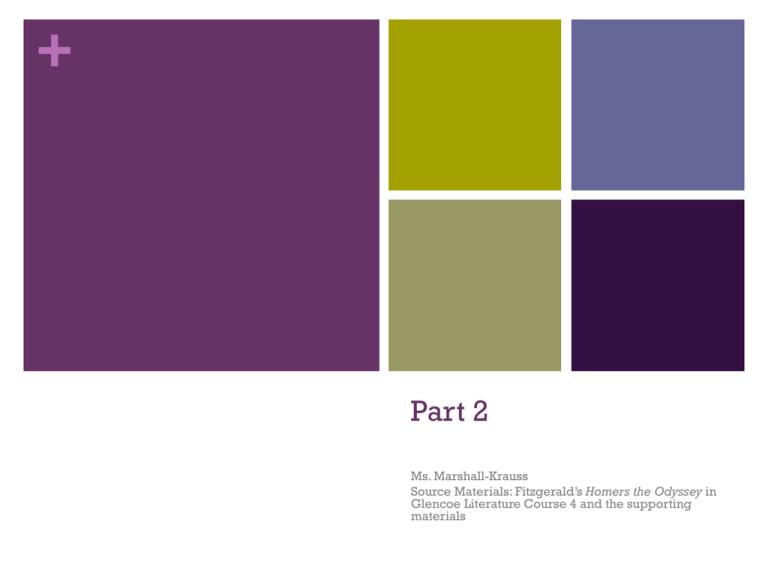
+ Part 2 Ms. Marshall-Krauss Source Materials: Fitzgerald’s Homers the Odyssey in Glencoe Literature Course 4 and the supporting materials + 39 Circe and the Sirens October 11, 2011 Warm up: What did you learn yesterday about Greek culture? Do you think it will apply to today’s reading of the Odyssey? Explain. Today’s objective is to read the first part of Part 2 of the Odyssey, review the vocabulary by finding the lines in the text, write a timeline of events, and if time, answer theme questions. + 39 Part 2 Vocabulary Directions: While we read the first part of Part 2 in the Odyssey, record the lines and line numbers the words are used in. In addition to the three words from the vocabulary homework, add three new words you find in today’s reading. + Timeline 40 Chronological 1. Raid on Cicones 2. Lotus Eaters 3. Cyclops 4. Bag of Winds 5. Laestrygonians 6. Circe 7. Land of the Dead 8. Sirens 9. … 10. Calypso 11. Phaecians In the Story 1. Calypso’s Island + 40 Homework Page 846, #1,6, and 15 + 43 Part 2: Scylla and Charybdis October 13, 2011 Warm up: Copy the definition below. Personification: giving human qualities to inanimate objects. Today’s objective is read Part 2: Scylla and Charybdis in the Odyssey and to discuss the answers to the theme questions. + 39 Answers to page 846 As we check the answers, write any information you missed in a different color. #1. He plugs their ears with wax. They tie him to the mast. #6. The calm slows the ship, prolonging the time of exposure to the Siren’s song and the likelihood the men will succumb. #12. He is like a stern father of willful children, who believes only he knows best. (Is this a good thing or not? Each student will have individual answers.) + 43 Reading While you read you are looking for several things. Remember a good listening strategy is to jot down important notes. Under your warm up on page 43, write subtitles to help organize your notes. Possible personification (find at least two) Important plot events Vocabulary in context (write the word and line numbers) + 43 After you read Check In your notes as a group. a different color, write at least one thing from someone in your group that you didn’t have in your notes. + 44 Reflection View the picture on page 837. How does the artist’s depiction of this scene in the Odyssey compare with what you envision as you read? Explain. Homework: Answer questions 2, 7, and 12 from page 846 in your spirals. + 45 Part 2: Personification October 14, 2011 Warm Up: Glue the blue paper on page 45 and the white paper on the bottom of 46 in your spirals Next, read the instructions on the top of the blue paper. Today’s objective is to write, identify, and analyze personification by writing paragraphs. 46 Personification Analysis Choose the example of personification you like the best and make a literal drawing of it on the top of page 46. See the following examples. Example: The fog swallowed the city. Example: The angry sea licked the hull of the ship. Example: The sun peeked out of the clouds. 46 Personification Analysis Beowulf Example An example of personification in Beowulf is “your fame as a fighter? It is a triumph song that ocean thunders to her farthest shore.” (61-62) The ocean is being personified. The ocean is yelling of Beowulf’s fame as a fighter. Hrothgar means that Beowulf’s fame is known the world over as if the ocean carried his story to all the lands. Identify the example and state what part of the quote is the example. Explain what the object is doing that is human. Explain what is actually meant by the use of the figurative language. 47-48 Personification Analysis Find an example of personification in the Odyssey Part 2. Copy the example on the top of page 47 and draw a picture of the example under it. Analyze it by breaking it into parts on the top of page 48. Refer to the example paragraph. 48 Personification Reflection Why do we analyze figurative language in English class? What do we gain from it? Answer in a paragraph or more on the bottom of page 48. Homework: Appositive Homework due Wednesday.

